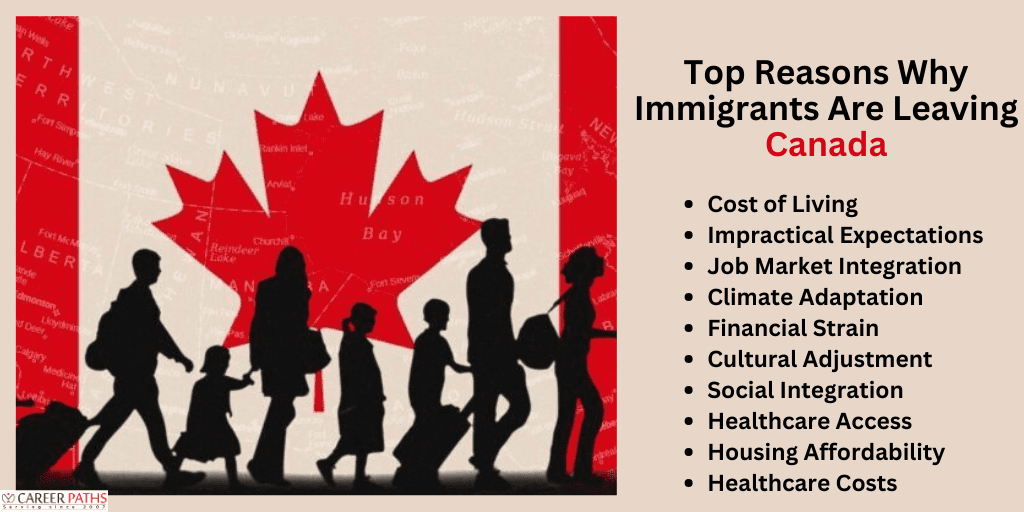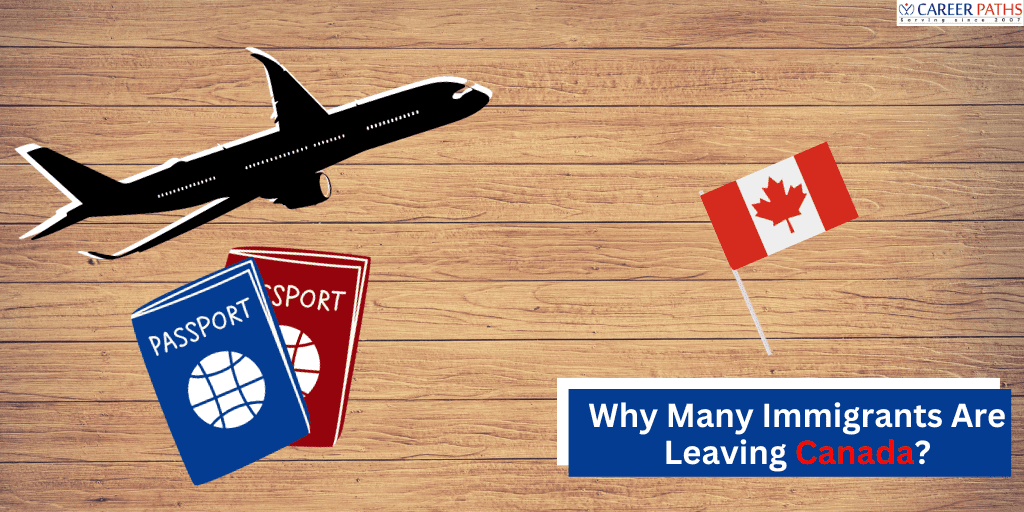Seeking a better future in Canada, hundreds of people travel there each year from all over the world. However, a growing number of immigrants have left in recent years, and many of them are having difficulty making ends meet. Many immigrants who had aspirations of establishing roots in Canada are constrained by the country’s outrageous property market and high cost of living. Some analysts worry that this migration may damage Canada’s reputation as a safe refuge for people looking to start over.
Canada’s population was declining, with an aging population leaving a lasting impact. The administration of Prime Minister Justin Trudeau believed that immigration would be the best way to address this, and their risk has paid off. The government’s statistics arm, Statistics Canada, states that Canada’s population has increased at its quickest rate in six decades, coinciding with the country’s current economic boom. The clock, however, has started to gradually go the other way. During the first half of 2023, 42,000 individuals departed Canada. Government figures show that 93,818 persons departed Canada in 2022, and 85,927 left the nation the year before.
In 2019, the number of immigrants departing Canada hit a record high in the previous 20 years. This was said in research released recently by the Institute for Canadian Citizenship (ICC), an organization that assists immigrants. Although the number fell during the epidemic, Statistics Canada data indicates that the trend is once again rising. 263,000 individuals arrived in Canada for permanent residence in that year. Consequently, the number of individuals departing Canada is significantly lower in contrast. On the other hand, an increasing number of analysts are highly concerned about individuals leaving Canada.
One of the primary initiatives of Trudeau’s administration is in risk of failing because so many people are fleeing the nation that was founded on immigration. Over the last eight years, Canada has given permanent residency to 2.5 million individuals. At least six persons who have left or are in the process of leaving Canada because of the high expense of living have been interviewed by Reuters.
One of them is Kara. The woman came to Canada from Hong Kong as a refugee in 2022. She lives in a one-bedroom basement apartment in Scarborough, a suburb of Toronto, for which she pays 650 Canadian dollars, which is equivalent to $474 US dollars. She spends 30% of her monthly income on rent.
A 25-year-old woman said, “I never thought I would have to live in a basement room in a Western country.” She did not reveal her real name because she fled Hong Kong in 2019 after protesting against the recently repealed extradition bill.
Three part-time jobs are held by Kara. The minimum wage in Ontario is 16.55 Canadian dollars per hour, which is what she makes. She then enroll in an adult education program to earn a university degree. “I have to spend every penny,” she declared. In Hong Kong, she managed to save almost one-third of her monthly salary.
Top 10 Reasons Why Immigrants Are Leaving Canada

Cost of Living
At 0.2% of the overall population, persons departed Canada in the middle of the 1990s. Government statistics indicate that this percentage is now 0.09%; even though this rate is low, immigration experts and attorneys caution that an increase in this figure might harm Canada’s reputation as a desirable destination for newcomers.
According to Daniel Bernhard, CEO of the Institute for Canadian Citizenship (ICC), having a good first year as an immigrant is crucial. After that, they can choose to stay or not. The primary concern raised by newcomers is the rapidly increasing expense of housing. This has been determined to be the primary justification for relocating abroad. To purchase a property in Canada, a family must, on average, pay 60% of their monthly salary into housing. This cost is 80% in Toronto and 98% in Vancouver.
Impractical Expectations
Although internet media frequently presents Canada as a dreamlike travel destination, it is important to keep in mind that no nation is flawless. Impractical hopes for quick success or carefree riches accumulation might eventually cause disillusionment and leave. In Canada, reaching objectives takes perseverance, time, and work, just like any other attempt. Although difficulties are unavoidable, they should be seen as chances for development rather than insurmountable barriers. It is critical to approach Canadian life with reasonable expectations and a readiness to adjust in order to get through inevitably difficult times.
Job Market Integration
While some immigrants to Canada arrive with optimistic visions of securing their desired positions, transitioning to the Canadian job market can be more complex than anticipated. Previous work experience with multinational corporations abroad, while valuable, does not guarantee direct translation to the same roles in Canada. Landing your ideal job may be possible, but it is more likely to require flexibility and adaptation. Be prepared for a potential 1-3 year search for your specific industry position, even with extensive home country experience. The location and timing of your arrival also play a role in your employment prospects. Remember, not finding your field-specific role initially is not a dead end. Opportunities exist in other sectors, like retail or restaurants, offering minimum wage to cover basic expenses. While there’s a chance you might not land your dream job immediately, dedication, effort, and acquiring Canadian experience will ultimately pave the way for success. Be mindful that employers might leverage your lack of Canadian experience by offering lower pay. Therefore, gaining Canadian experience becomes crucial for achieving your long-term career goals.
Climate Adaptation
Canadian winters present a significant acclimatization challenge for newcomers accustomed to warmer climates. While the entire country experiences cold seasons, the duration and intensity vary. In Ontario, for instance, six to seven months witness frosty conditions, with two to three of those months potentially reaching lows of -25 to -30 degrees Celsius. Northern provinces like Saskatchewan and Alberta typically encounter even colder temperatures. While initial adjustment can be daunting, individuals generally acclimate over time. However, winter’s severity discourages some newcomers, leading to their departure. Engaging in popular winter sports like hockey, ice skating, skiing, and snowboarding could potentially aid integration and combat this trend. It is crucial to remember that many individuals have never experienced such extreme temperatures, highlighting the importance of an accurate portrayal of Canadian winters before relocation.
Financial Strain
Despite its reputation for prosperity, Canada presents nuanced challenges for newcomers seeking rapid wealth accumulation. Recent inflation, particularly in essential goods, coupled with settlement costs and significant taxation, can create a financially demanding initial period. The misconception of effortless riches can lead to disillusionment and thoughts of departure. However, it is crucial to acknowledge the enduring opportunity Canada offers. Numerous successful immigrants have built fulfilling lives here, demonstrating that financial success is attainable through commitment and adaptation. While hard work is undoubtedly required, Canada’s potential for long-term prosperity should not be underestimated.
High taxes
Canada’s tax structure, while contributing to its robust social programs, presents a potential financial hurdle for newcomers already grappling with the challenges of establishing themselves in a new nation. This factor, alongside others like navigating credential recognition and adapting to cultural differences, can influence the decisions of some immigrants who may explore opportunities elsewhere.
Cultural Adjustment
The physical and emotional distance from loved ones presents a significant challenge for many newcomers to Canada. Financial constraints, limited vacation time, and the initial solo arrival of many immigrants contribute to this hardship. Feelings of alienation and loneliness arise from this separation, particularly amongst those forced to leave behind spouses, children, and parents. The daunting experience of entering a foreign nation lacking a built-in support network can create a powerful pull towards returning home, potentially leading to an immigrant’s decision to depart Canada.
Social Integration
The integration of immigrants into their new host society can be significantly impeded by the challenges of forging social connections and establishing a supportive network, particularly when compounded by cultural or linguistic differences. These challenges may result from a number of things, such as having trouble adjusting to new social mores and traditions and having poor command of the language of the majority. Although overcoming these obstacles frequently calls for consistent work and the acquisition of new interpersonal skills, social integration may have significant benefits, including a greater sense of community, enhanced well-being, and a sense of belonging in the adopted country.
Healthcare Access
Canadian residents facing serious medical diagnoses or family caregiving needs may seek treatment or return home due to the availability of support networks and potential challenges with sponsoring family members for immigration. This highlights the complex interplay between personal health, family obligations, and the legal realities of foreign residency, even for those with established lives in Canada.
Housing Affordability
The sky-rocketing housing rate is one of the reasons for immigrants leaving Canada. Some immigrants are leaving Canada due to rising housing costs, especially in large areas like Toronto and Vancouver where a tiny property may cost millions of dollars. This problem is not exclusive to immigrants; a large number of Canadians also need help finding inexpensive rental accommodation or even becoming homeowners owing to a shortage of available properties and rising demand.
Healthcare Costs
While public healthcare in Canada is free it does not cover everything. Prescription drugs and dental services are not included, potentially leading to high costs for complex treatments. Interestingly, patients often see nurses first, followed by doctors for brief consultations and prescriptions. Additionally, long wait times are common, with emergency room visits potentially requiring 3-4 hours of waiting. Even though there are numerous cons regarding living in Canada, by recognizing the challenges and actively implementing solutions, Canada can boost its immigration system. attracting and retaining valuable newcomers who contribute to its vibrant and diverse society.











